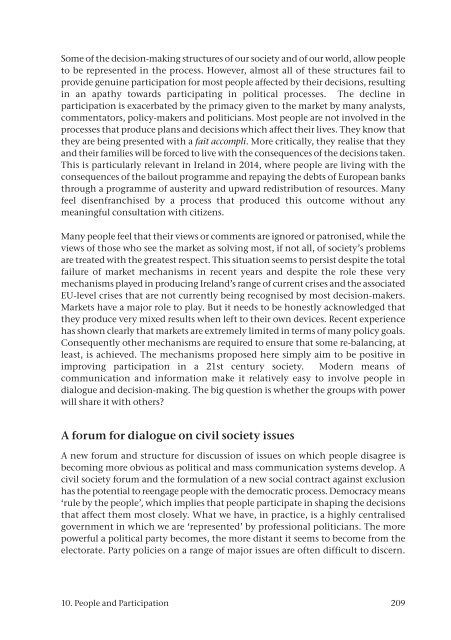2014-04-22 - Socio Economic Review 2014 - Full text and cover - FINAL
2014-04-22 - Socio Economic Review 2014 - Full text and cover - FINAL
2014-04-22 - Socio Economic Review 2014 - Full text and cover - FINAL
You also want an ePaper? Increase the reach of your titles
YUMPU automatically turns print PDFs into web optimized ePapers that Google loves.
Some of the decision-making structures of our society <strong>and</strong> of our world, allow people<br />
to be represented in the process. However, almost all of these structures fail to<br />
provide genuine participation for most people affected by their decisions, resulting<br />
in an apathy towards participating in political processes. The decline in<br />
participation is exacerbated by the primacy given to the market by many analysts,<br />
commentators, policy-makers <strong>and</strong> politicians. Most people are not involved in the<br />
processes that produce plans <strong>and</strong> decisions which affect their lives. They know that<br />
they are being presented with a fait accompli. More critically, they realise that they<br />
<strong>and</strong> their families will be forced to live with the consequences of the decisions taken.<br />
This is particularly relevant in Irel<strong>and</strong> in <strong>2014</strong>, where people are living with the<br />
consequences of the bailout programme <strong>and</strong> repaying the debts of European banks<br />
through a programme of austerity <strong>and</strong> upward redistribution of resources. Many<br />
feel disenfranchised by a process that produced this outcome without any<br />
meaningful consultation with citizens.<br />
Many people feel that their views or comments are ignored or patronised, while the<br />
views of those who see the market as solving most, if not all, of society’s problems<br />
are treated with the greatest respect. This situation seems to persist despite the total<br />
failure of market mechanisms in recent years <strong>and</strong> despite the role these very<br />
mechanisms played in producing Irel<strong>and</strong>’s range of current crises <strong>and</strong> the associated<br />
EU-level crises that are not currently being recognised by most decision-makers.<br />
Markets have a major role to play. But it needs to be honestly acknowledged that<br />
they produce very mixed results when left to their own devices. Recent experience<br />
has shown clearly that markets are extremely limited in terms of many policy goals.<br />
Consequently other mechanisms are required to ensure that some re-balancing, at<br />
least, is achieved. The mechanisms proposed here simply aim to be positive in<br />
improving participation in a 21st century society. Modern means of<br />
communication <strong>and</strong> information make it relatively easy to involve people in<br />
dialogue <strong>and</strong> decision-making. The big question is whether the groups with power<br />
will share it with others?<br />
A forum for dialogue on civil society issues<br />
A new forum <strong>and</strong> structure for discussion of issues on which people disagree is<br />
becoming more obvious as political <strong>and</strong> mass communication systems develop. A<br />
civil society forum <strong>and</strong> the formulation of a new social contract against exclusion<br />
has the potential to reengage people with the democratic process. Democracy means<br />
‘rule by the people’, which implies that people participate in shaping the decisions<br />
that affect them most closely. What we have, in practice, is a highly centralised<br />
government in which we are ‘represented’ by professional politicians. The more<br />
powerful a political party becomes, the more distant it seems to become from the<br />
electorate. Party policies on a range of major issues are often difficult to discern.<br />
10. People <strong>and</strong> Participation 209



